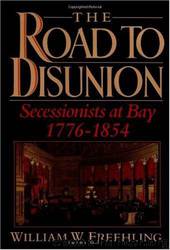The Road to Disunion: Secessionists at Bay, 1776-1854 by William W. Freehling

Author:William W. Freehling
Language: eng
Format: mobi
Tags: History
ISBN: 9780195058147
Publisher: Oxford University Press
Published: 1990-09-01T10:00:00+00:00
8
In the face of Henry Wise’s war on the Van Buren-sanctioned evasive gag rule wording, Henry Pinckney felt driven to seek more uncompromising terminology. A worried Pinckney sought out Wise. The Virginia Oppositionist convinced the Carolina ex-Nullifier that calling abolition only “inexpedient” in Washington, D.C., was unsound. Pinckney agreed to go for the true-blue word “unconstitutional.” Pinckney promised Wise, and repeated the promise to South Carolina constituents, that his committee would include that loyal southern phrase in its report to the House.21
With Pinckney’s promise, southern loyalty tactics had again proved their power to change national slavery politics. Pressure from outsiders, Hammond and South Carolinians, had initially pressed Southern Democrats to press Northern Democrats for some gag rule. Now pressure from insiders, Wise and Southern Oppositionists, was pressing Southern Democrats to press northern allies for further concessions.
Northern Democrats, again prefiguring the next 25 years of slavery politics, could be pressed only so far. Van Buren had publicly called abolition in D.C. only inexpedient. He could not go for unconstitutionality under pressure now, lest he seem utterly the Slavepower’s slave. Pinckney’s promise to Wise accordingly became the first casualty of the strain Southern Oppositionists placed on National Democrats.
In May 1836, Pinckney’s Select Comiittee recommended to the House that antislavery petitons be tabled “without being printed or referred.” Automatic tabling was proper because “Congress possessed no constitutional authority to interfere in any way with with … slavery in any … States.” Congress also “ought not” interfere “with slavery in the District of Columbia.”
Ought not! That code term had scarcely passed Pinckney’s lips before Henry Wise screamed he had been betrayed. Pinckney had given Wise an “express pledge” that the committee’s resolutions would declare abolition in the capital unconstitutional. The South Carolina traitor, cursed the Virginia Oppositionist, now massed behind “a defense of Southern interest” without “an expression of Southern feeling.”22
Wise swiftly received further education in compromised southern feeling. Benjamin C. Howard of Maryland, a Democrat, made explicit that border dream of a slaveless future which Henry Clay had left implicit in the Senate. Pinckney was right, said the Marylander, to call District emancipation presently inexpedient. But the constitutional door must be open for future action.
For now Benjamin C. Howard wished Pinckney’s gag rule to be imposed on abolitionists. A slaveholder himself, “he left his children surrounded by slaves.” His Maryland neighborhood feared that “in the siege which the fanatics of the North were carrying on against the District, some of the bombs” might “burst on the way.”
But this Maryland slaveholder was hardly the sort of committed soldier an Unconditional Perpetualist wanted manning bomb shelters. Benjamin Howard bragged to Congress that Maryland had appropriated $200,000 to colonize emancipated slaves. As presiding officer of the Maryland Colonization Society, he could proudly report that this safe form of removal was working so well that “emancipation” was running “ahead” of colonization funds. “An increase of pecuniary means” would “eventuate in the conversion of that State into a nonslaveholding State.” This salutary process showed that “humanity as well
Download
This site does not store any files on its server. We only index and link to content provided by other sites. Please contact the content providers to delete copyright contents if any and email us, we'll remove relevant links or contents immediately.
| Espionage | Hoaxes & Deceptions |
| Murder & Mayhem | Organized Crime |
| Serial Killers | White Collar Crime |
Mindhunter: Inside the FBI's Elite Serial Crime Unit by John E. Douglas & Mark Olshaker(9324)
Wiseguy by Nicholas Pileggi(5770)
Room 212 by Kate Stewart(5105)
Hitman by Howie Carr(5089)
Secrecy World by Jake Bernstein(4742)
Killers of the Flower Moon: The Osage Murders and the Birth of the FBI by David Grann(4436)
Papillon (English) by Henri Charrière(4263)
Breaking Free by Rachel Jeffs(4216)
Killers of the Flower Moon by David Grann(4042)
Say Nothing by Patrick Radden Keefe(3975)
American Kingpin by Nick Bilton(3876)
The Secret Barrister by The Secret Barrister(3699)
Molly's Game: From Hollywood's Elite to Wall Street's Billionaire Boys Club, My High-Stakes Adventure in the World of Underground Poker by Molly Bloom(3531)
Mysteries by Colin Wilson(3447)
In Cold Blood by Truman Capote(3378)
Signature in the Cell: DNA and the Evidence for Intelligent Design by Stephen C. Meyer(3132)
I'll Be Gone in the Dark by Michelle McNamara(3082)
Rogue Trader by Leeson Nick(3040)
Bunk by Kevin Young(2993)
